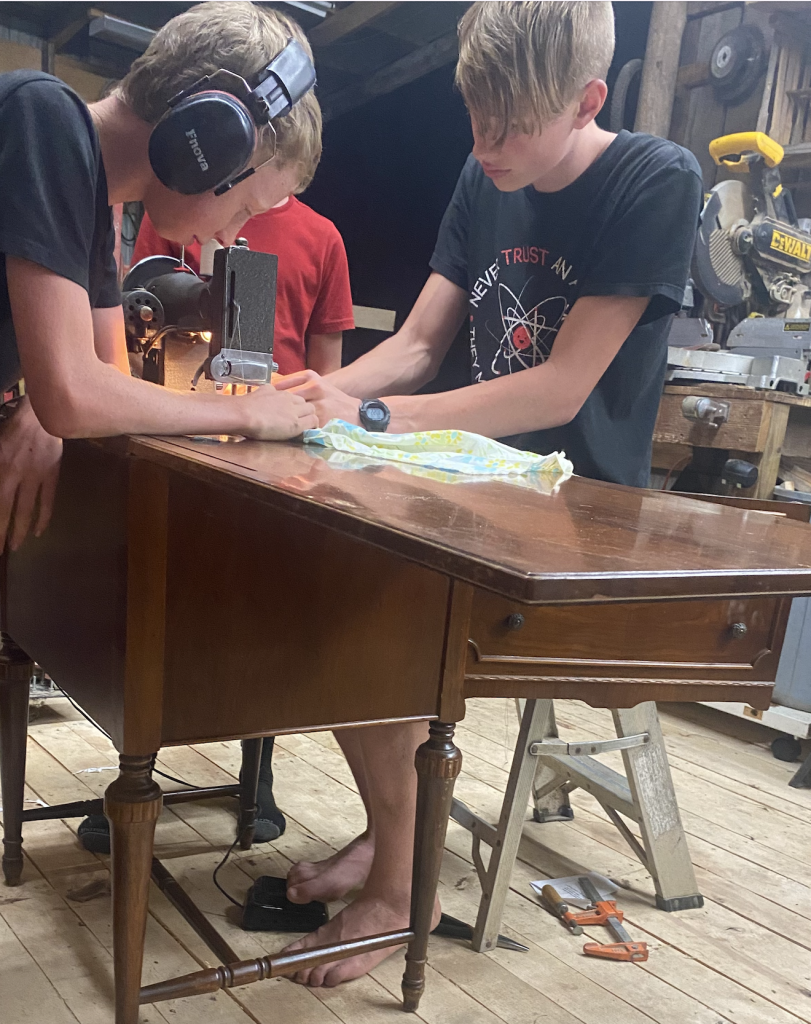Homeschooling is becoming increasingly popular in the United States. Every year more and more families choose to begin teaching their children at home. Most parents feel capable of teaching things like adding or subtracting, or the sounds letters make, but looking forward towards the future of the high school years can stir up worry and doubt. Let me assure you that there is nothing to fear! Homeschooling the high school years is one of the best parts of the journey.

From unschooling to college
In my growing up years, I had an education experience that was out of the norm. I went to a public school through eighth grade, then was homeschooled during my high school years. I was thirteen years old when my mom decided to homeschool my sisters and me, and I was suddenly brought into the world of delight directed learning (although that wasn’t what we called it then). I spent the next five years reading, crafting, sharing my thoughts with my family, playing musical instruments, writing letters and stories, and diving into whatever interest I currently held.
With my mom’s prompting I did a bit of an algebra book but didn’t get very far. Mostly I just enjoyed life and dreamed about the future. In my later teen years I suddenly decided I wanted to go to college. I went to the library to borrow a study guide for the GED test (which gives you a high school equivalency certificate). The book was very long and boring so I decided just to try taking the test without any further study. I passed with a score that (just barely!) met the minimum needed for a scholarship and was granted full tuition.
My experience with the college years
With that, I jumped into the college experience and thoroughly enjoyed myself. I quickly became the president of the honor society and won the affections of my professors because I had something that it seems was rather rare: enthusiasm. Since I hadn’t done any formal academics during my high school years everything was fresh and exciting, and I completed assignments with gusto. Rather than be a hindrance to me, my unstructured high school years had been a blessing. They had given me practice in diving deep into whatever I was interested in. This quality followed me into my college years and gave me an advantage. I wasn’t seeking a degree because I felt that I had no other choice. I was doing what I wanted to do at the time, so I gave it my all.
Another five years later I walked away with my Bachelors degree and jumped right into my next endeavor. I was now married and newly pregnant. I couldn’t wait to be a mama. These days I am homeschooling my own children and allowing them to follow their passions just as I did. At the same time, I continue to pursue my own interests right alongside them. I consider my husband and myself to be the lead learners of the family. Our children watch us explore our interests and find resources to learn from, so they do the same. In my years of homeschooling (and observing) my own ten children I have developed a strategy that has worked for all of my kids, even though the details change depending on the individual.

How to guide your children in the early years
When it comes to academics in our home, my goal is to focus on guiding my children in practicing basic skills (like writing, reading, and arithmetic) in the early years, then help them identify their gifts and achieve their own goals during the high school years. Homeschooling begins at birth. Our children learn to babble and mimic facial expressions. They learn to sit, roll, crawl and walk. Without much effort we teach them how to speak our language, beginning with basic words then moving on to more complex things like counting. In the same way we will teach our children how to read. They’ll show an interest in their perfect timing, and we’ll gently guide the learning process.

When I sense my child is ready for more structure, we begin daily requirements. I keep this list very short. My intention is to gently encourage growth in the academic disciplines without causing my child to push back or get burned out. 15-20 minutes of concentrated work in a subject is enough to keep the momentum of learning moving forward. It may seem like an insignificant amount when you look at the whole of your day, but over time it adds up to a collection of skills that will help your child to move on to the next phase of their learning: developing their own passions.
The high school years
The teen years are an amazing time where your child is in between the play and learning of childhood and the responsibilities of adulthood. They have the basic skills that have been practiced during the younger years and the curiosity to learn more about the things that interest them, and how that fits into the world outside your home.
It is tempting to want to plan a heavy load of “official” learning requirements for your high schooler. The time that you have left to direct your child’s learning suddenly feels very short, and the list of things that they don’t know seems long.
This is when it is vitally important that you stop and remind yourself of the ultimate goal. What do I want my child to carry into adulthood?
Since in our home the goal for our children is that they would become capable adults who can support themselves with the things they enjoy, our emphasis during the high school years is helping them to learn and practice practical life skills while having plenty of time to develop their unique skills and interests. Knowing how to communicate with others, establishing a good work ethic and leadership skills, being able to think outside the box, having the confidence to try new things and fail. These are the traits that I want my teenagers to possess.

My husband and I aren’t as interested in our high schoolers excelling academically as we are in giving them the time and resources to actually move forward into developing their interests into something that will practically serve them in adulthood.
How many of us have completed our educational journey only to say “I have a degree, but now what?”
I don’t want that to be the story for any of my children. I want their life to be purposeful at each stage of development. God created each of them with a unique story and I don’t want to risk stifling that with a lot of unnecessary busy work.
So what does high school look like in our house? It depends on the child.

How we guide our high schoolers
Since we have walked this road with our children from birth, we have the benefit of knowing our child’s strengths and weaknesses, and the things that interest them. At certain points throughout the year I meet with my child to assess what they have been doing, and what we might want to change. I help them identify skills that they need to learn to support their future goals. We talk about things that might be good for them to do on a regular basis to help them to grow academically or personally in ways that would benefit them going forward. We develop a short list of “daily requirements” that they will complete on their own, and things that they will do with the family. As their interests deepen we find ways to encourage them in those areas and connect them with people or resources that could be helpful.
Rather than fill their days with a long list of general high school requirements for them to complete, we seek to help them use their hours to do things that will be an asset to their future goals.
Be willing to challenge the norm
If you were raised viewing the current high school model as “normal” then this will take a mindset shift. It may be helpful to reflect upon your own high school experience and ask yourself what really stuck? Which learning experiences remained helpful to your life as an adult? Were you required to learn anything that seemed pointless at the time, and has proven to be unhelpful in your post high school life?
Just as there is often “busywork” assigned to students in younger years as a tool for managing many children in a classroom with a single teacher, there can be unnecessary requirements placed upon teenages as they move toward their short term goal of a high school degree. Rather than give in to the pressure of our fears and begin to heap these same generic requirements upon our teens, let us be bold as their parents and leaders and think in a revolutionary way about the best way to allow our unique child to grow.
The high school years are a valuable season for these future adults. My role is to do what I can to guard their time and allow them space to flourish.

Have a child who is college bound?
In this series, I will take you step by step through the process of planning the high school years and how to document the process. We’ll be using the book Cure The Fear of Homeschooling High School as our guide. ACCESS THE VIDEOS!
- .
- Book Recommendations
- Electives & Extracurriculars
- Feed Your Family
- Handicrafts
- Highschool Years
- Holidays
- Homemaking
- Homeschool Day in the Life
- Homeschool How To
- Language Arts
- Math
- Organization
- Parenting
- Science & Nature Study
- Social Studies
- The Little Years


This was refreshing to me
I have four children and have homeschooled since birth. But now my oldest will be starting 9th grade I was beginning to feel uncertain approaching this new season of homeschooling in my life that I am not familiar with or have any idea how to homeschool a high schooler.
I enjoyed your life story and found it a true blessing and encouragement for me to continue to homeschool my high schooler as I was beginning to second guess my abilities.
Thank you so much
I’m so glad to hear I could be an encouragement to you! The high school years have been such a blessing for us. When you set your fears about “doing enough” aside you will witness your child blossom and grow. It is beautiful.
What a great read! We”re homelearning in BC, Canada and we have to meet the learning outcomes set by the government and then we qualify for a GED, now I’m second guessing this plan. Thanks for your insight!